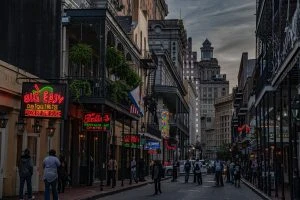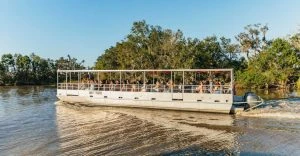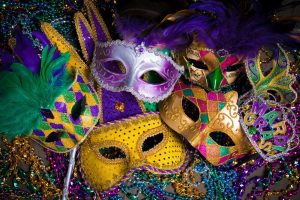
Things to Do in New Orleans for Adventure and Mystery Lovers
If you’re planning your trip and looking for things to do in New Orleans, don’t settle for the usual tourist traps. From untamed bayous to haunted streets, the Crescent City offers a thrilling mix of wild nature and paranormal history—all in a single day. Here’s how to experience the best of both worlds with two unforgettable local favorites: Bayou Swamp Tours and Big Easy Ghost Tours. Morning: Get Wild with a Swamp Tour Start your day deep in Cajun Country with Bayou Swamp Tours. Just 30 minutes outside New Orleans, this tour takes you into the heart of Louisiana’s wetlands. Glide through mysterious bayous and moss-draped cypress trees as you spot gators, raccoons, wild hogs, and dozens of bird species. If you’re looking for a New Orleans swamp tour that’s authentic, accessible, and full of wildlife, this is the one. Tour Options: Why it’s a must-do:This is hands-down one of the most memorable things to do near New Orleans. It’s not a staged experience—this is real Louisiana wilderness. Guides are locals with deep roots in Cajun culture, and they’ll show you parts of the swamp tourists rarely see. Afternoon: Refuel and Explore the French Quarter After the swamp tour, head back to the city and grab lunch in the French Quarter. Try po’ boys at Verti Marte, or grab beignets and coffee at Café du Monde. Then, walk off the carbs with a self-guided stroll past historic buildings, street performers, and Voodoo shops. This is the perfect time to browse, snap photos, and soak in the spirit of the city. If you want to keep the adrenaline going, pop into a local Voodoo museum or take a quick streetcar ride down St. Charles Avenue. Evening: Take a Ghost Tour That Will Haunt You (In the Best Way) As the sun sets, the real fun begins. Big Easy Ghost Tours offers some of the most spine-chilling (and historically accurate) experiences in town. These tours dig into the darker side of New Orleans—think murders, hauntings, and unsolved mysteries. Top Tours: Why it’s unforgettable:With charismatic guides, true-crime storytelling, and real paranormal history, these ghost tours are among the top things to do in New Orleans at night. Whether you believe in ghosts or not, you’ll leave entertained (and maybe a little spooked). Bonus Tip: Book Ahead and Bundle Your Experience Both Bayou Swamp Tours and Big Easy Ghost Tours are popular, especially on weekends and during festival season. Book in advance to guarantee your spot. Want to do both in one day? Plan your swamp tour in the morning and ghost tour after dinner—it’s a perfect mix of nature and the supernatural. One Day, Two Adventures If you’re wondering what to do in New Orleans beyond Bourbon Street and beads, this itinerary gives you an authentic taste of what makes the city legendary: wild nature, rich folklore, and stories that refuse to die. So don’t just visit New Orleans. Experience it.

Explore Culture, Soul, and the Best Swamp Tour in New Orleans Before Essence Festival
The Essence Festival is more than just a music event—it’s a celebration of Black excellence, culture, and creativity, all in one of the most vibrant cities in the world. But if you’re heading to New Orleans just for the Superdome shows, you’re missing out. To fully experience the city’s magic, you need to start before the lights go up. Here’s what to do before Essence Festival in New Orleans—including how to ride the best swamp tour in New Orleans, explore its haunted past, and soak up the soul of the city before the first note plays. 1. Ride the Best Swamp Tour in New Orleans Before you dive into panels, concerts, and late-night crawfish boils, get out into the wild side of Louisiana. The best swamp tour in New Orleans isn’t just about snapping pictures of alligators—it’s about reconnecting with nature, history, and a part of the South most festivalgoers miss. We recommend Bayou Swamp Tours, hands down. They offer both airboat adventures for thrill-seekers and pontoon boat tours for a more relaxed, scenic ride through the cypress-lined bayous. What makes Bayou Swamp Tours the best swamp tour in New Orleans? It’s their expert guides, reliable hotel pickups, and real Louisiana energy—no touristy gimmicks, just wild beauty and authentic storytelling. 2. Ghosts and Grit: Walk the Shadows of the French Quarter Once you’ve seen the bayou by day, explore the haunted French Quarter by night. Big Easy Ghost Tours offers some of the most compelling walking tours in the city, with local guides who blend real history, folklore, and a few chills to keep things interesting. Whether you’re into voodoo, haunted mansions, or unsolved mysteries, this tour adds an eerie, unforgettable layer to your Essence weekend. And it’s a perfect fit for the city’s vibe—music and magic, all wrapped into one. 3. More Must-Dos Before the Festival Starts Not sure what to do before Essence Festival in New Orleans beyond tours? Here are a few more ways to get grounded before the weekend explodes with energy: 🎺 Frenchmen Street Live jazz, local artists, and a raw, unfiltered NOLA energy. Swing by after your ghost tour for music that’s just as soulful as what you’ll hear at Essence—just in a different key. 🍳 Black-Owned Brunch Spots Start your day right at places like Ma Momma’s House, Willie Mae’s Scotch House, or The Munch Factory. Come hungry, leave happy. 🛍️ Support Local Creators Skip the chain stores and browse local Black-owned boutiques, bookstores, and street markets. You’ll find one-of-a-kind art, fashion, and keepsakes—many made by artists attending the festival themselves. 🏛️ Dive Into Culture Visit the New Orleans African American Museum or the Backstreet Cultural Museum for a deeper understanding of the traditions and resistance that shaped the city you’re celebrating. Your Essence Festival Weekend Itinerary Thursday (Arrival Day) Friday (Festival Kickoff) Planning what to do before Essence Festival in New Orleans is about more than filling time—it’s about setting the tone. Final Checklist If you’re wondering what to do before Essence Festival in New Orleans, this is your blueprint. From swamp to street to stage—you’re not just attending the festival. You’re becoming part of the city’s story.

What to Do Before UFC 318 in New Orleans
With UFC 318: Holloway vs. Poirier 3 set for July 19, 2025, at the Smoothie King Center, New Orleans is gearing up for a weekend of high-energy action. But if you’re flying in just for the fight, you’re missing the point. The real win? Making the entire weekend unforgettable. Here’s your guide on what to do before UFC 318 in New Orleans to make the most of your trip. Take a Swamp Tour – Nature Meets Adrenaline Before the punches start flying, get your blood pumping on the water. Bayou Swamp Tours is one of the best experiences New Orleans has to offer. Choose between high-speed airboats that rip through the marsh or slower, scenic pontoon boats perfect for spotting gators, wild hogs, eagles, and more. The best part? They offer easy shuttle pick-up from your hotel, so you can stay focused on enjoying, not planning. Explore the Haunted Side After your swamp run, switch gears and dive into the shadows of the French Quarter with Big Easy Ghost Tours. These walking tours hit haunted houses, cemeteries, and dimly lit alleys, all while guides recount centuries of eerie local legends. It’s the perfect atmospheric ramp-up to a night of blood, sweat, and combat. Your Itinerary: Pre-Fight Power Flow Time Activity Friday Morning Head out early for a Bayou Swamp Tour (choose airboat or pontoon) Friday Afternoon Return to the city, relax, hydrate Friday Evening Join a Ghost Walking Tour Saturday (Fight Day) Brunch, explore lightly, rest up — doors open early evening for UFC 318 Planning what to do before UFC 318 in New Orleans doesn’t need to be complicated. You just need to stack the right mix of adrenaline and culture. Why These Tours? Real Encounters, Not Tourist Traps Bayou Swamp Tours is known for its knowledgeable guides and authentic routes. You’re not just floating through swampland—you’re in it. The airboat gets you moving. The pontoon slows you down. Both get you closer to Louisiana’s heart. Ghost Tours With Grit These aren’t kid-friendly Halloween gimmicks. Big Easy Ghost Tours brings the real stories, dark history, and authentic pacing you’d want before a night of UFC intensity. It’s immersive, memorable, and just the right amount of eerie. C. Location, Location Everything is timed and placed with your convenience in mind. Bayou pickup happens right at your hotel. Ghost tours meet you in the French Quarter. No wasted time. No random detours. Just optimized fun. Optimize Your UFC Weekend Frame the Weekend Like a Fighter Here’s the thing: UFC 318 isn’t just the fight. It’s the whole build-up. The story you get to tell. The vibe you bring into the arena. By exploring the wild bayous and haunted streets beforehand, you’re living the narrative, not just watching it. What to do before UFC 318 in New Orleans? This. It’s what turns a cool trip into a core memory. Final Checklist Make UFC 318 more than a ticket. Make it a story. Own the days before the card even starts. So if you’re wondering what to do before UFC 318 in New Orleans, now you know. Do it right. Do it all. Then walk into that arena like you earned your seat in the front row.

What’s the Best Season for Swamp Tours in New Orleans?
Choosing the best season for swamp tours is crucial for an optimal experience, as it can affect wildlife sightings, weather conditions, and the overall enjoyment of the excursion. New Orleans is renowned for its vibrant culture, rich history, and unique natural landscapes, including the iconic swamps that surround the city. Swamp tours offer a fascinating glimpse into the bayou’s ecosystem and the Cajun and Creole cultures that thrive in this environment. Key Takeaways Exploring the Best Time to Visit the Swamps Weather Patterns and Seasonal Considerations When planning a swamp tour in New Orleans, understanding the local weather patterns and seasonal considerations is crucial for a pleasant experience. The best time for a swamp tour is typically during the spring months, from late February to May, when the weather is mild and the wildlife is most active. Note that while tours operate year-round, the experience can vary greatly depending on the season. Summer tours may require additional preparation for the heat, while winter tours might offer a different perspective of the swamps with fewer crowds. Keep in mind that tours are subject to cancellation due to weather conditions. Wildlife Activity Throughout the Year The bayous and swamps surrounding New Orleans are teeming with life, and the wildlife activity varies significantly with the seasons. Spring and fall are particularly vibrant times for nature enthusiasts, as migratory birds pass through and native species are generally more active. The best wildlife viewing opportunities often occur in the morning or late afternoon when animals are most active. Planning your tour around these times can enhance the experience significantly. Tour Availability and Off-Peak Advantages While the high season for swamp tours in New Orleans typically aligns with the city’s overall peak tourist periods, off-peak seasons offer unique advantages for visitors seeking a more intimate experience. During these times, you may find that tours are less crowded, allowing for a more personalized interaction with guides and a closer connection with the bayou’s serene environment. Off-peak periods can also coincide with some of the best weather windows and local events, providing an excellent backdrop for your swamp adventure. It’s important to note that some tours may have limited availability or different operating hours outside of the peak season. Always check with us for the most current information and to secure your preferred time slot. The mild period from October through November is another lovely time to explore New Orleans and to taste a wide variety of local seafood, making it an ideal time for swamp tours as well. Types of Swamp Tours Available Small Airboat Tours: Intimacy and Thrills Small airboat tours offer an unparalleled opportunity to get up close and personal with the vibrant ecosystem of the New Orleans swamps. These tours provide an intimate experience, allowing you to navigate narrower waterways and approach wildlife in their natural habitat without the noise and crowds of larger tours. Small airboat tours are ideal for those seeking a thrilling ride through the bayous, complete with the rush of the wind and the chance to see alligators, birds, and other wildlife from a unique vantage point. Due to their smaller size, these tours can fill up quickly, especially during peak tourist seasons. It’s advisable to book in advance to secure your spot. While the airboats are fast and exciting, they also require guests to wear hearing protection due to the engine noise, which is something to consider when planning your adventure. Large Airboat Tours: Group Dynamics Large airboat tours offer a unique way to experience the swamps of New Orleans with a dynamic group atmosphere. These tours are ideal for larger parties, accommodating up to 16 passengers, which makes them perfect for family reunions, corporate events, or a group of friends. The spacious airboats provide a stable platform for viewing the diverse ecosystems and wildlife of the bayou. The thrill of gliding over the water at speed with a group adds an exciting social dimension to the swamp tour experience. Remember to book in advance, especially during peak seasons, to secure your spot on this popular New Orleans adventure. Pontoon Boat Swamp Tours: Comfort and Accessibility Pontoon boat tours offer a unique blend of comfort and accessibility, making them an excellent choice for families, photographers, and those with mobility concerns. These tours are known for their stability and spaciousness, providing a relaxed environment to enjoy the natural beauty of the swamps. Pontoon boat tours cater to those who prefer a less rushed, more serene swamp experience. The gentle pace of the tour allows for ample time to soak in the sights and sounds of the bayou. For those interested in the practicalities of booking a pontoon boat tour, it’s important to note that these tours are often more available than their airboat counterparts, especially during peak seasons. They can accommodate larger groups, making them a favorite for family reunions, educational trips, or corporate events. Cultural and Historical Aspects of Swamp Tours Cajun and Creole Influences on the Bayou The bayous of New Orleans are not just a natural wonder; they’re a vibrant tapestry of Cajun and Creole cultures. Embark on a journey that intertwines the thrill of wildlife with the richness of Louisiana’s heritage. Experience the bayous through the eyes of a Cajun guide, who brings to life the history, mystery, and cultural influences of the swamp lands. The bayou tour is an immersive experience that goes beyond sightseeing. It’s an intimate exploration of the living history and cultural tapestry that make New Orleans unique. The intertwining of Cajun and Creole cultures is evident in the architecture, stories, and even the food you’ll encounter. From the remote cypress swamps to the grandeur of the plantations, each stop is a chapter in the story of Louisiana’s bayou country. Historic Plantation Visits: Houmas House and Laura Plantation A journey through the historic plantations near New Orleans offers a unique glimpse into the region’s past. Visiting Houmas House and Laura Plantation provides an immersive experience into the Creole and Cajun cultures

Top 4 Best Festivals In New Orleans
New Orleans, a city bursting with a fusion of cultures and vibrant traditions, is renowned not only for its music and food but also for hosting some of the most colorful and lively festivals in the world, including the best festivals in New Orleans. While Mardi Gras may be its most famous, there are numerous other events that showcase the city’s rich cultural tapestry. These festivals are not just parties; they are a profound expression of the diverse communities that make up the soul of New Orleans. Here’s a closer look at each festival, offering a unique flavor of this dynamic city’s spirit. Mardi Gras: The Epitome of New Orleans Festivals Mardi Gras is not just a festival; it is a season of its own in the heart of New Orleans, embodying the jubilant culture of the city. Recognized among the top twenty celebrations in the United States, Mardi Gras captivates thousands with its exuberant parades, intricate floats, and performers dressed in dazzling costumes. The streets come alive with the rhythms of jazz and brass bands as the city dons its vibrant hues of purple, green, and gold. This festival is a must-see, offering an immersive experience with dancing, singing, and traditional cuisines that resonate with the joy and extravagance of New Orleans. French Quarter Festival: A Cultural Celebration Another jewel in the crown of the best festivals in New Orleans is the French Quarter Festival. Started in 1984, this event was initially a way to bring locals back to one of the city’s most historic areas. Taking place in April, the festival now draws music lovers from all over with its incredible lineup of musicians who perform across twenty-three stages. The genres vary from traditional jazz and blues to R&B and funk, celebrating the deep musical roots of New Orleans. Alongside the music, attendees can savor an array of local dishes and drinks, making it a true feast for the senses. Voodoo Music and Arts Experience The Voodoo Music and Arts Experience is a unique festival that reflects the mystical and enigmatic side of New Orleans. Stemming from the city’s historical connections to West African spiritual traditions merged with Catholicism, this festival celebrates the intriguing world of New Orleans Voodoo. Every year, local and international artists gather to perform in a setting that blends music, art, and the esoteric Voodoo culture, offering a profound glimpse into the spiritual and artistic pulse of New Orleans. White Linen Night: A Nostalgic Celebration White Linen Night, held during the sultry New Orleans summer, pays homage to a time before air conditioning, when residents wore white linen to stay cool. Started in 1994 by local businesses, this festival has evolved into an artistic and social event, known alternatively as Dirty Linen Night. Participants dress in their finest white linens and stroll through art galleries, celebrating local art and community spirit. This event offers a blend of art, fashion, and cultural appreciation, making it a standout among the best festivals in New Orleans. Each festival in New Orleans has its own charm and character, reflecting different facets of the city’s heritage. From the historic streets of the French Quarter to the mystical vibes of Voodoo celebrations, these festivals offer a window into the soul of New Orleans. They are more than just events; they are a celebration of life, culture, and the enduring spirit of one of America’s most iconic cities. Whether you are drawn by the music, the food, the art, or the sheer spectacle, the best festivals in New Orleans promise unforgettable experiences that resonate long after the last parade has rolled by.
Celebrate St. Patrick’s Day in the New Orleans
New Orleans is famous for its vibrant culture, world-class parties, and legendary festivals, and St. Patrick’s Day is no exception. While many people associate the city with Mardi Gras, the Irish influence in New Orleans has created another major celebration that is just as lively. Whether you’re of Irish descent or just looking for an excuse to wear green and enjoy the festivities, the Big Easy offers an unforgettable experience packed with music, dancing, and, of course, plenty of drinks. From grand parades that fill the streets with revelers to historic Irish pubs serving up pints of Guinness, New Orleans goes all out for St. Patrick’s Day. And if you’re looking to take a break from the city’s party scene, there’s an unexpected but thrilling way to celebrate—by venturing into Louisiana’s breathtaking swamps. No matter your style, there’s something for everyone to enjoy on this special holiday. Parades and Street Festivities New Orleans takes St. Patrick’s Day seriously, with multiple parades happening across the city. The most famous ones include: Where to Grab a Pint No St. Patrick’s Day celebration is complete without a proper pint of Guinness or an Irish whiskey toast. Check out these top Irish pubs in New Orleans: Join a St. Patrick’s Day Pub Crawl For those who want to experience multiple iconic bars in one night, joining a St. Patrick’s Day Pub Crawl is the way to go. Big Easy Ghost Tours offers a unique spin on the classic pub crawl, blending history, mystery, and plenty of drinks. Their St. Paddy’s edition takes you through the French Quarter’s most legendary watering holes, where you’ll enjoy exclusive drink specials, lively company, and fascinating ghost stories tied to New Orleans’ rich history. Booking in advance is recommended, as spots fill up quickly. A Unique Twist: Take a Swamp Tour While the city’s festivities are a highlight, why not take your St. Patrick’s Day adventure to the next level? Escape the crowds and explore Louisiana’s breathtaking swamps. A guided swamp tour lets you experience the wild side of the state, with opportunities to see alligators, cypress trees, and Spanish moss-covered bayous. Many tours depart from just outside New Orleans, making it an easy half-day excursion before or after the celebrations. Tips for an Unforgettable St. Patrick’s Day in NOLA New Orleans is famous for its vibrant culture, world-class parties, and legendary festivals, and St. Patrick’s Day is no exception. While many people associate the city with Mardi Gras, the Irish influence in New Orleans has created another major celebration that is just as lively. Whether you’re of Irish descent or just looking for an excuse to wear green and enjoy the festivities, the Big Easy offers an unforgettable experience packed with music, dancing, and, of course, plenty of drinks. From grand parades that fill the streets with revelers to historic Irish pubs serving up pints of Guinness, New Orleans goes all out for St. Patrick’s Day. And if you’re looking to take a break from the city’s party scene, there’s an unexpected but thrilling way to celebrate—by venturing into Louisiana’s breathtaking swamps. No matter your style, there’s something for everyone to enjoy on this special holiday.
